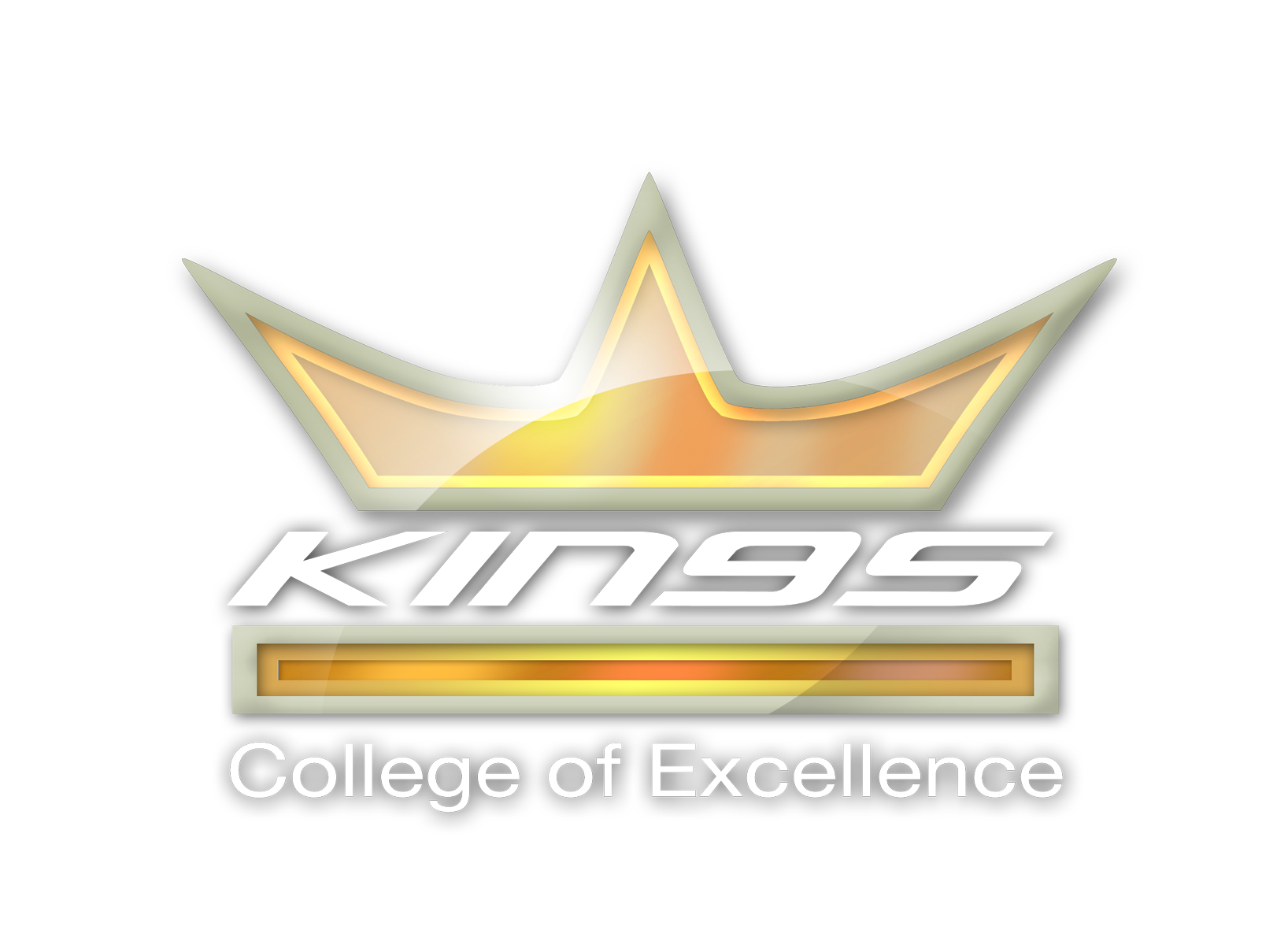Key Dates 2025-2026
Open Evening & Registration Thursday 15th September 2025
Lectures start at 7 pm on Thursday 6th October 2025
Course Structure and Methodology
Each subject will be taught over a period of eight weeks; with each session lasting approximately one hour. A variety of teaching methods will be adopted to ensure that students gain a clear understanding of each subject. This will involve electronic retrieval and submission of course lectures and assignments.
In addition to classroom time, students will be required to put in a significant amount of personal study and research.
Graduation
A graduation ceremony takes place annually in the August following course completion.
Assessment Criteria
Although the focus of Kings College of Excellence is the ability to put what is learnt into practice, a formal system of continuous assessment using a variety of methods will be employed.
Students will be required to undertake individual and group work presentations and an extended essay to be selected in consultation with their course tutor.
Attendance records and general attitude to the course will also be taken into consideration. The pass mark will be 50% on examinations, projects and dissertations.

Aim
The aim of this course is to explore the redemptive work of Jesus Christ and to understand its significance for believers as new creations in Christ. Students will be challenged to grasp the key truths of their position and authority in Christ - for their own personal spiritual growth, and to communicate these truths effectively as they pursue their appointed ministries.
Content
- To explore the meaning and context of New Creation.
- To ascertain the purpose and importance of New Creation.
- To analyse the benefits and privileges of the New Creation.
- To understand the reality and application of our new nature.
Learning outcomes
On completion, students should be able to:
- understand the significance of the realities of the new creation image;
- have a firm grasp of the nature and extent of our authority and freedom in Christ;
- appreciate the significance of the ministry of reconciliation that God has given us.
Required reading
The Holy Bible.
Recommended reading
New Creation Realities by E. W. Kenyon. Publishers: Kenyon’s Gospel Publishing Society, Inc.
New Creation Image: Knowing who you are in Christ by A. L. & Joyce Gill. Publishers: Powerhouse Publishing.

Aim
To explore the principles, concepts and characteristics of the Kingdom of God as presented in the scriptures. In addition, students will be challenged to grasp and apply the practical implications of being citizens of the Kingdom of God - made possible through the redemptive work of Christ.
Content
- Explore the meaning, components, priority, importance and purpose of the Kingdom of God as presented in the scriptures.
- Survey, discuss and analyse principles of the Kingdom and their importance in our ongoing relationship with God and others.
- Understand the practical implications of entering the Kingdom of God - made possible through the redemptive work of Christ.
Learning outcomes
On completion, students should be able to:
- gain an understanding of the centrality of the kingdom of God in His purpose for mankind;
- comprehend and apply kingdom principles in the context of daily living;
- understand and commit to a lifestyle and ministry based on the kingdom teachings of Jesus Christ;
- appreciate the significance of the ministry of reconciliation that God has given us.
Required reading
The Holy Bible
Recommended reading
Kingdom Principles by Myles Munroe: Publishers: Destiny Image Publishers, Inc.
Rediscovering the Kingdom by Myles Munroe. Publishers: Destiny Image Publishers, Inc.

Aim:
This subject will identify and explore the biblical teaching and practice of faith. It will challenge participants to actively develop faith as illustrated in the Word of God.
Learning outcomes:
- On completion of this subject students should have a workable grasp of the nature of true biblical faith
- Identify various hurdles to living the life faith
- Demonstrate a biblical understanding of faith
- Understand the relationship between faith and works
Content:
- Definitions of faith.
- Examples of biblical faith
- Faith v works.
- Faith and the Word of God.
- The hallmarks of genuine faith.
- The challenges of faith.
Required reading:
Unleashing the Power of Faith. Author: Dr David Y Cho
Faith: Moving the Heart and Hand of God - Author: Phil Pringle

Aim:
Explore the connection between ministry success and family. You will be taught to identify tensions and issues that may lead to crisis in relationships and ministry. Course content:- Understanding the family
- God's master plan for the family
- Laying a solid foundation
- The minister and his family
- Identifying and responding to pressure points
- Honoring obligations

Aim:
- This subject will introduce students the historical, cultural, and religious context of the New Testament. They will also explore their literary characteristics, teachings and place in the biblical revelation.
Learning outcomes:
- From this subject students will develop:
- A clearer understanding and appreciation for the historical, religious, and cultural background of the New Testament.
- Understand the importance of the inter-testamental period.
- Be aware of the various literary compositions in the New Testament.
- Understand issues relating to dated, purpose and authorship.
- Know the general background of selected books.
Required reading:
New Testament Survey Authors : Kevin J. Conner and Ken Malmin

Aim:
- To examine the historical, cultural and religious context of the Old Testament, their literary characteristics, their main themes and essential teaching and it significance for our understanding of the New Testament.
Learning outcomes:
- Have an accurate understanding of the chronology of the Old Testament.
- Grasp the essential themes of selected books
- Understand the classification of various books
- Be aware of the context in which each book was written
- Explore the background to each book.
- Understand the overall purpose of the Old Testament.
- Understand the significance of the Old Testament for Christianity.
Content:
- The purpose of the Old Testament.
- The general structure of the Old Testament
- Themes of the Old Testament.
- The chronology of the Old Testament.
- The divisions of the Old Testament.
- Relationship between the Old Testament and the New Testament.
- Dates, authorship and purpose for writing.
- Main teaching of the Old Testament: its significance today.
Required reading:
Old Testament Survey Author : Paul R. House and Eric Mitchell

This course is designed to provide students with a solid foundation for biblical preaching by exploring the implications of preaching a text and preaching the Gospel. Preaching the Gospel is considered from historical, biblical, theological, pastoral and creative perspectives with a view to producing sermons that engage the world and offer hope.
Learning outcomes:
- To develop lifelong skills in the exegesis of the scriptures as the foundation for every sermon.
- To realise the importance of the preacher to create sermons in which the scriptures are applied to the lives of listeners in a way that is relevant, inspirational, clear and effective.
- To understand the need to create an atmosphere in which the preacher is open to the Holy Spirit in order to proclaim the Word of God.
- To develop a foundational understanding of preaching as vital to the life of the local church.
- To understand essential homiletical steps in the preparation and delivery of biblical sermons.
- To challenge students to create an atmosphere for preaching that is rooted in the Holy Spirit.
- To present each student with an opportunity to preach one sermon based on the skills and ideas discussed and learned in the class.

Aim:
To explore the key issues and challenges confronting Christian leaders in contemporary society. It will examine the role of Christian leaders within the church and the wider society. In addition, it will explore the Biblical teaching on leadership and the qualities of effective spiritual leaders.
Learning Outcomes:
- On completion of this module students should:
- Have a clear understanding of the principles and practice of good Biblical leadership.
- Identify Biblical examples of effective and bad leadership
- Understand the challenges facing Christian leaders.
- Be better equipped to be effective spiritual leaders in the area of ministry to which the Lord has called them.
Content:
- The definition of leadership
- Christian leadership in a changing world
- The requirements for Christian leadership.
- The purpose of leadership.
Required reading:
The Leadership Secrets of Billy Graham Author: - By Harold Myra, Marshall Shelley - Zondervan (2005)
Becoming a Leader Author: - by Myles Munroe
Leadership Author: – Rick Joyner
Recommended reading
Spirit of Leadership - Author: Myles Munroe
In Search of Timothy - Author: Tony Cooke

Aim:
Develop an awareness of the importance of vision in the pursuit of success in life and ministry. You will be guided towards developing a specific plan for achieving their vision. Course content:- Defining vision
- The source of vision
- Developing a solid plan for fulfilling vision
- Capturing God's vision
- Developing a visionary mindset
- Eliminating vision killers

Aim:
Gain understanding about the principles of planting and growing healthy dynamic churches in the 21st century. It will explore the reasons for church decline and strategies for breaking growth barriers. Course content:- An understanding of the Great Commission
- Principles of church planting
- The reasons for growth and decline
- Effective ministry plan
- A well-defined mission

Aim:
This subject will explore both the theory and the practice of prayer. It will highlight examples of effective prayer from Scripture and from past and present day Christian experience. Practically, it will challenge students to move towards making prayer a central factor in their personal lives and ministry.
Learning outcomes:
- On completion of this subject students should:
- Have a clear understanding of the purpose of prayer
- Understand that there are principles to answered prayers
- Be aware of the causes of unanswered prayers.
- Understand the role of prayer in spiritual warfare and deliverance
- Understand the different kinds of prayers illustrated in Scripture.
Content:
- The purpose of prayer.
- Praying with authority.
- Prayer and the sovereignty of God- why pray if God already knows everything.
- Intercessory prayer
- Tools of prayer- fasting, the Name of Jesus, the Word, etc.
- Warfare prayer
- Hindrances to answered prayers.
- Reasons for unanswered prayers.
- Targeting our prayers (the concept of spiritual mapping).
- Jesus’ model prayer.
- Results of prayer.
Required reading:
Understanding the purpose and power of prayer. Author: Dr. Myles Munroe. Publisher: Whitaker Books.
Prayer Shield. Author: C.Peter Wagner. Publishers: Regal Books.
Recommended reading:
The Power of Positive Prayer Bible. Author: Matthew Ashimolowo. [Lessons on Prayer]
Praying with Power. Author: C. Peter Wagner. Publishers: Destiny Images.
Intercessory Prayer. Author: Dutch Sheets. Publishers: Regal Books

Aim:
The course will introduce students to effective methods of studying and interpreting the Bible for both devotional and teaching purposes. They will be taught to view the Bible in its original historical and cultural setting and to understand the relevance of its message for today.
Learning Outcomes:
- On completion of this subject students should have:
- A greater appreciation and understanding of the uniqueness of the Bible and embrace it as the revealed Word of God.
- Understand the development of the canon of Scripture; understand its form, content and chronology.
- A clear grasp of the central message of the Bible as it relates to Christ.
Content:
- The nature and structure of the Bible
- Themes and literary classifications
- The meaning of inspiration and the canon of Scripture.
- Historical and cultural settings
- Themes and relationship between the Testaments
- Method of interpretation
- Tools of interpretation.
Required reading:
Bible Study Method. Author: Rick Warren.
The Origin of the Bible. Author: P. W Comfort (Ed). Publishers: Tyndale House.
New Lion Handbook of the Bible. Author: D& P Alexander. Publishers: Lion Books.
Recommended reading:
What the Bible is all about. Author: Dr. Henrietta C. Mears. Publishers: Regal.
How to Read the Bible for all its worth. Authors: Gordon D. Fee & Douglas Stuart. Publishers: Zondervan.

Aim:
This subject will challenge students to build their lives and ministry on biblical ethical principles. They will examine the Biblical ethical framework and understand its essential difference from secular approach to human life and behavior.
Learning outcomes:
- On completion of this subject students should:
- Understand and appreciate the basis of Christian ethics
- Recognize the various competing ethical systems
- Be equipped to recognized areas of conflict between Christian and secular ethics.
- Have a clearer understanding of the Biblical teaching concerning important aspects of human life and behavior.
- Be better equipped to apply Biblical ethics to their personal lives.
Content:
- The definition of Christian ethics.
- The basis of Christian ethics.
- Christian ethics v secular ethics.
- Major ethical systems.
Recommended reading:
Ministerial Ethics – A Guide for Spirit filled leaders - Author: by T Burton Pierce
Christian ethics: an essential guide - Author: by Robin W. Lovin
The sources of Christian Ethics - Author: by Servais Pinckaers
Ministerial Ethics - Author: Dag Heward-Mills
Ministerial Ethics and Etiquette - Author: Nolan B. Harmon

The basis of this course is the finished work of redemption as it relates to the ministry of divine health and healing. Students will be guided in a study of the central truths of divine healing as reflected in the scriptures. They will also survey the impact of the 20th century healing ministry. Emphasis will be placed on the need for the present day church to actively pursue God's provision of divine health and healing.
Learning outcomes:
- To understand God's provision of divine health and healing
- To understand the significance of the atonement
- To explore the rise of 20th century healing movement
- To discuss issues in divine health and healing
- To understand ‘Ministering healing’

Aim:
This course is designed to explore the holistic nature of the Christian life and the various elements necessary for success. It will challenge students to identify pressure points in their lives that can have a negative impact on personal relationships, work and ministry.
Learning outcomes:
- On completion of this subject students should:
- Develop a biblical understanding of success.
- Identify and eliminate barriers to success.
- Understanding the role of vision in achieving success.
- Establish a solid foundation for success
- Cultivate and positive relationships.
- Understand the importance of family in God’s plan for success.
Content:
- Success Definitions
- Identifying and eliminating barriers to success.
- Developing a vision for life and ministry
- Developing a disciplined life style-spiritual, intellectual, emotional, and physical.
- Cultivating positive relationships at home, work and in ministry.
- How to combine ministry and home life
- Required reading:
Spirit driven Success Author: Dani Johnson
Pathways to success Author: Mensa Otabil

Aim:
This subject will challenge students to understand experience and demonstrate the power of the Holy Spirit in their personal lives and ministry. Major emphasis will be placed on the gifts of the Holy Spirit and participants will be encouraged to identify and developed their gifts.
Learning outcomes:
- On completion students should understand:
- The role and function of the Holy Spirit in the Old Testament.
- The names titles and symbols for the Holy Spirit.
- The Holy Spirit in the life and ministry of Jesus
- Appreciate the role of the Holy Spirit in the Early and present church age.
- Identify the gifts of the Holy Spirit
- Understand the fruit of the Holy Spirit.
- Ministering in the power of the Holy Spirit.
Content:
- Who is the Holy Spirit?(the Person of the Holy Spirit.
- The Spirit in the Old Testament
- The roles and functions of the Holy Spirit.
- The work of the Spirit in the life of Christ
- Jesus’ teaching on the Holy Spirit.
- The titles of the Holy Spirit
- The baptism in the Holy Spirit.
Required reading:
Welcome Holy Spirit. Author Benny Hinn. Publishers: Thomas Nelson.
The Holy Spirit My Senior Partner. Author: David Yonggi Cho
Beginners Guide to Spiritual Gifts. Author Sam Storm.
Recommended reading:
God inside out: an in depth study of the Holy Spirit - Author S. Ponsonby
The Most Important Person on Earth: the Holy Spirit, Governor of the Kingdom. Author: Dr. Myles Munroe. Publishers; Whitaker House.

Aim:
This subject will challenge students to explore and develop principles for pursuing and acquiring financial freedom within the context and values of the Christian faith.
Learning outcomes:
On completion of this subject students will:
- Develop an understanding of various types of wealth creation instruments.
- Understand the principles of financial planning.
- Understand the process of starting and running a business.
- Be committed to a biblical approach to wealth creation and management.
Content:
- The Biblical basis and motivation for wealth creation.
- Instruments of wealth creation.
- Wise financial planning.
- Starting and succeeding in business.
- Handling mistakes.
Required reading:
The Ten M’s of Money: Author: Matthew Ashimolowo.
33 laws of Wealth Creation Author: Matthew Ashimolowo
12 Major Steps for Perpetuating Wealth Author: Matthew Ashimolowo
30 Reasons for Company Ownership Author: Matthew Ashimolowo
Recommended reading:
The Coming Wealth Transfer: Author: Matthew Ashimolowo.
Be the Best: Author: Matthew Ashimolowo.
101 Answers to Money Problems (Vol 1-4) Author: Matthew Ashimolowo
The 5 “W”s of Wealth Creation & Successful Property Investment Both Books Author: Elizabeth Benjamin.
Method of Assessment/ Assessment Criteria: Individual & Group Assignments including Class Presentations

Aim:
This course will establish the framework for participants to manage their personal lives. You will be challenged to take a holistic approach to life and learn how to employ strategies for physical, spiritual and emotional well-being. Course content:- Spiritual wellness
- Achieving balance
- Eating for living
- Setting targets and priorities
- Attitude for life
- Recreation
- Setting boundaries
- Relationships

Aim:
To explore the history of the church’s use of technology. It will examine the emergence of social media and its impact on society, in general. In addition, it will explore ways of using new technology effectively in this era and discuss the values of the new media culture.
Learning Outcomes:
On completion of this module, students should:
- Have an understanding of the role that technology has played within the church over centuries
- Appreciate the significant paradigm shift that has occurred in the nature of communication as a result of digital media
- Know the basic keys for effective use of new technology in ministry
- Be familiar with a number of the practical applications of new technology
Content:
- Definition of technology
- History of the church’s use of technology
- Impact of the digital era
- Effective use of new technology in ministry
- Practical applications of new technologies
Recommended Reading
Using Technology for Your Church: A Guide for Pastors and Church Leaders
The Social Church, A Theology of Digital Communication: Justin Wise
CHURCH AND THE COMMUNITY
Aim:
To explore the meaning and characteristics of what constitutes a community within the context of the local church. To discuss and explore how an individual can thrive and function effectively in a community. In addition, to gain understanding of the purpose and role of the community in the life of the local church.
Learning Outcomes:
On completion of this module, students should:
- Be able to define what constitutes a community.
- Identify and appreciate the factors that affect growth in the community as well as the personal qualities required to thrive in communities.
- Know how to reconcile their personal uniqueness with the common goals of a community
- Be familiar with the mission of a community.
Content:
- Definition of a Community
- Life and nature of a community
- Growth of a community
- Thriving within a community
- Community as a place of communion
- Leading a community
- Mission of a community
Recommended reading
Community and Growth - Jean Vanier

Aim:
This subject will help students to understand how to grapple and deal with real issues using scriptural principles and some agreeable secular concepts. It will to some extent equip students with the skills for basic counseling and whet the appetite of those who may want to go further to obtain a recognized qualification in counseling.
Learning outcomes:
- On completion of this subject students should:
- Understanding the Biblical basis and rational for pastoral care and counseling.
- Be confident is offering pastoral within the context of the church
- Have a clearer understanding of the way in which particular needs and human crisis are addressed.
- Explore different approached and counseling theories.
Content:
- The Biblical basis for pastoral care and counseling.
- The differences and similarities of Christian and secular counseling
- Counseling on ethical and value issues.
- Marriage enrichment and marriage crisis counseling.
- Bereavement and crisis counseling.
- Different models adopted in counseling.
- Dealing with root causes of problems with an understanding of developmental the milestone.
Required reading:
Christian Counseling: A Comprehensive Guide- Author: Gary R. Collins

Aim:
To explore the meaning and characteristics of what constitutes a community within the context of the local church. To discuss and explore how an individual can thrive and function effectively in a community. In addition, to gain understanding of the purpose and role of the community in the life of the local church.
Learning Outcomes:
On completion of this module, students should:
- Be able to define what constitutes a community.
- Identify and appreciate the factors that affect growth in the community as well as the personal qualities required to thrive in communities.
- Know how to reconcile their personal uniqueness with the common goals of a community
- Be familiar with the mission of a community.
Content:
- Definition of a Community
- Life and nature of a community
- Growth of a community
- Thriving within a community
- Community as a place of communion
- Leading a community
- Mission of a community
Recommended reading
Community and Growth - Jean Vanier

Aim:
This course will introduce students to effective methods of studying and interpreting the Bible for both devotional and teaching purposes. Students will be taught to view the Bible in it’s original historical and cultural setting and to understand the relevance of the Bible’s message for today.
Content:
- To understand the nature and structure of the Bible.
- To discuss themes and literary classifications.
- To unearth the meaning of inspiration and the canon of Scripture.
- To explore historical and cultural settings.
- To examine the themes and relationship between the Testaments.
- To explore methods of interpretation.
- To examine tools of Interpretation.

Aim:
- To provide an insight into effective ways to plan, organise, resource, assess and report about the administrative and financial functions of the church
- To have an oversight of the significance of Governance and compliance frameworks in running a church/ministry
- To align & contextualise the administrative and financial management of the church alongside the spiritual and pastoral function.
Learning outcomes:
On completion of this subject students will:
- Develop an understanding of church administration and financial matters.
- Understand the principles of governance, organisation, planning and accountability.
- Understand the operational, administrative and governance procedures and structures required to run a church effectively and efficiently.
Content:
- Administration in the local church
- What does the Bible say about Church Administration?
- Pillars of Church Management
- Pastoral Responsibility for Church Administration.
- Governance & Trusteeship of the Church
- Managing Church Finance & Understanding the Compliance Framework
Recommended reading:
- Church Administration & Finance Manual: Resources for Leading the Local Church by Otto Crumroy, Stan Kakawka & Frank M Witman
- Church Administration Handbook by Bruce Powers
- Publications by The Charity Commission on Governance & Administration of UK Charities (especially churches)
- Church Annual Reports
Method of Assessment/ Assessment Criteria: Individual & Group Assignments including Class Presentations
Entry Requirement
All prospective students are required to prayerfully complete an application form, evidencing a genuine commitment to Christian ministry. In principle, they should be a member or in attendance at a Bible believing church. Where possible, prospective students must have the recommendation of their pastor or a recognized person in authority.
Applicants should have a good written and oral command of English and be able to demonstrate the ability and willingness to apply themselves to diligent study. There is no interview process
